Nissan Qashqai VS Toyota C-HR
In the competitive compact SUV segment, the Nissan Qashqai stands out with its spacious interior and advanced safety features, making it an ideal choice for families. On the other hand, the Toyota C-HR impresses with its bold design and fuel efficiency, appealing to younger, style-conscious buyers. Ultimately, the decision between these two popular models will depend on individual priorities, as both offer a blend of performance and versatility.
Nissan Qashqai
The Nissan Qashqai stands out in the compact SUV market with its sleek design and versatile features. Its smooth ride and refined interior make it a popular choice for both city driving and weekend adventures. Advanced safety technologies and user-friendly infotainment add to its appeal, ensuring a comfortable and secure driving experience for all passengers.
详细信息Toyota C-HR
The Toyota C-HR stands out with its distinctive and bold design that combines sleek, angular lines with a sporty posture. Its comfortable and stylish interior is equipped with advanced technology features, providing a seamless driving experience. The vehicle offers impressive handling and performance, making it a compelling choice for those who appreciate a blend of practicality and flair on the road.
详细信息Head-to-Head: The Nissan Qashqai vs. Toyota C-HR
The compact SUV segment has become a battleground for manufacturers striving to deliver the ultimate blend of style, practicality, and technology. Two prominent contenders in this space are the 2024 Nissan Qashqai and the Toyota C-HR. Both vehicles have gained a loyal following, but how do they stack up against each other? This article dives into their technical specifications and innovations to help you decide which one deserves a place in your garage.
Powertrains and Performance
Starting with the Nissan Qashqai, it boasts a range of powertrains that cater to different driving preferences. Customers can choose from petrol mild-hybrid and full hybrid options. The engine lineup includes 1.3-liter and 1.5-liter units, producing between 140 and 190 horsepower. Notably, the Qashqai offers both front-wheel and all-wheel-drive configurations, providing versatility for various terrains and weather conditions.
In terms of performance, the Qashqai achieves an acceleration of 0-100 km/h in as little as 7.9 seconds, with a top speed of 206 km/h. The fuel consumption ranges from 5.1 to 6.8 L/100km, which is competitive for a vehicle in this segment.
On the other hand, the Toyota C-HR focuses on hybrid technology, with a full hybrid and a plug-in hybrid option that includes a 1.8-liter engine and a more powerful 2.0-liter engine option that delivers up to 197 horsepower. Its acceleration times are equally impressive, with a swift 7.4 seconds from 0-100 km/h. However, the top speed is slightly lower than that of the Qashqai, capping at 180 km/h. Remarkably, the hybrid variants offer an astonishing fuel consumption rate, as low as 0.8 L/100km when considering electric-only driving.
Interior and Comfort
When it comes to interior space, the Nissan Qashqai offers a roomy cabin that can comfortably seat five passengers. The Qashqai’s trunk offers a generous capacity of up to 504 liters, making it suitable for families or weekend getaways. The focus on comfort extends to various high-tech features, with an infotainment system that supports both Apple CarPlay and Android Auto, along with a suite of driver-assistance features for enhanced safety.
The Toyota C-HR also provides a spacious interior for five, but its trunk space is slightly smaller at a maximum of 447 liters. Its cabin is characterized by a striking design and high-quality materials, contributing to an upscale feel. The C-HR integrates advanced technology as well, with a comprehensive infotainment system that includes Toyota's Safety Sense suite, offering features such as adaptive cruise control and lane-keeping assist.
Design and Aesthetics
Design plays a crucial role in the decision-making process for many buyers, and both the Qashqai and the C-HR showcase compelling aesthetics. The Qashqai sports a more traditional SUV silhouette, with sharp lines and bold front fascia that evokes a sense of confidence on the road.
Conversely, the Toyota C-HR opts for an innovative design that embodies a coupe-like profile, characterized by aggressive angles and a distinctive rear end. The C-HR’s design is often described as polarizing, either loved or loathed, which gives it a unique edge in the crowded SUV market.
Technology and Innovations
Both vehicles are equipped with advanced technology that enhances the driving experience. The Nissan Qashqai introduces features like ProPILOT Assist, a semi-autonomous driving system that helps maintain speed, distance, and lane position on the highway. The infotainment system is also enhanced with a larger touchscreen and improved connectivity options to make every journey more enjoyable.
In contrast, the Toyota C-HR is stepping ahead with its hybrid technology, offering an electric driving range of up to 67 km in its plug-in variant. This innovative approach not only enhances fuel efficiency but also aligns with the growing demand for more eco-friendly vehicles. The C-HR’s multimedia system includes the latest Toyota Touch 2 interface, which simplifies connectivity and access to a range of apps.
Conclusion
Both the 2024 Nissan Qashqai and Toyota C-HR present compelling choices in the compact SUV segment, each excelling in different areas. If you prioritize hybrid technology and fuel efficiency, the C-HR is undoubtedly an attractive option. Meanwhile, the Qashqai stands out with its robust powertrain options and spacious interior.
Ultimately, the best choice depends on individual needs and preferences. Test driving both models will give potential buyers the best insight into which vehicle fits their lifestyle. Regardless of which one you choose, you’re assured of a stylish, capable, and tech-savvy SUV that caters to modern needs.
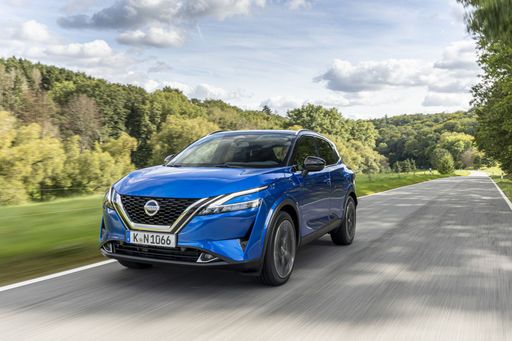 @ Nissan
@ Nissan
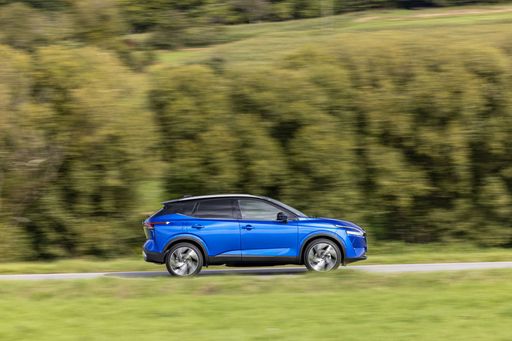 @ Nissan
@ Nissan
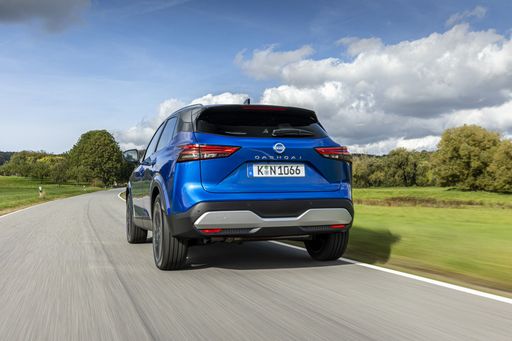 @ Nissan
@ Nissan
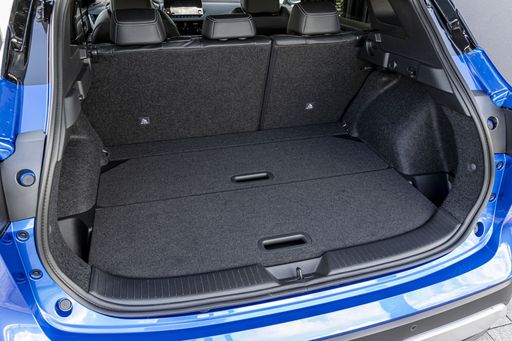 @ Nissan
@ Nissan
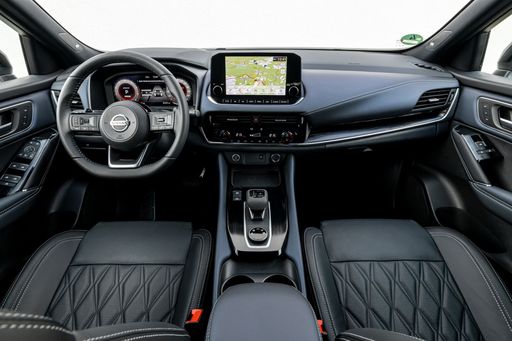 @ Nissan
@ Nissan
 @ Toyota
@ Toyota
 @ Toyota
@ Toyota
 @ Toyota
@ Toyota
 @ Toyota
@ Toyota
 @ Toyota
@ Toyota

|

|
|
|
|
成本和油耗 |
|
|---|---|
|
价格
约 34100 - 49500
€
|
价格
约 35000 - 50000
€
|
|
油耗 L/100公里
5.1 - 6.8
L
|
油耗 L/100公里
0.8 - 5.1
L
|
|
能耗 kWh/100公里
-
|
能耗 kWh/100公里
-
|
|
电动续航里程
-
|
电动续航里程
67
km
|
|
电池容量
-
|
电池容量
-
|
|
二氧化碳
116 - 154
g/km
|
二氧化碳
19 - 115
g/km
|
|
油箱容量
55
L
|
油箱容量
43
L
|
尺寸和车身 |
|
|
车身类型
SUV
|
车身类型
SUV
|
|
座位数
5
|
座位数
5
|
|
车门
5
|
车门
5
|
|
整备质量
1420 - 1665
kg
|
整备质量
1505 - 1755
kg
|
|
行李厢容量
479 - 504
L
|
行李厢容量
350 - 447
L
|
|
长度
4425
mm
|
长度
4362
mm
|
|
宽度
1835
mm
|
宽度
1832
mm
|
|
高度
1625
mm
|
高度
1558 - 1564
mm
|
|
载荷
466 - 520
kg
|
载荷
375 - 425
kg
|
发动机和性能 |
|
|
发动机类型
汽油轻混合动力, 全混合动力
|
发动机类型
全混合动力, 插电式混合动力
|
|
变速器
Manuel, 自动
|
变速器
自动
|
|
变速器详情
手动变速器, 无级变速器, 减速齿轮箱
|
变速器详情
无级变速器
|
|
驱动类型
前轮驱动, 四轮驱动
|
驱动类型
前轮驱动, 四轮驱动
|
|
功率 (马力)
140 - 190
马力
|
功率 (马力)
140 - 223
马力
|
|
加速 0-100公里/小时
7.9 - 10.2
s
|
加速 0-100公里/小时
7.4 - 9.9
s
|
|
最高速度
170 - 206
km/h
|
最高速度
175 - 180
km/h
|
|
扭矩
240 - 330
Nm
|
扭矩
-
|
|
气缸数量
3 - 4
|
气缸数量
4
|
|
功率 (kW)
103 - 140
kW
|
功率 (kW)
103 - 164
kW
|
|
发动机排量
1332 - 1497
cm3
|
发动机排量
1798 - 1987
cm3
|
|
最高速度
170 - 206
km/h
|
最高速度
175 - 180
km/h
|
概况 |
|
|
车型年份
2024
|
车型年份
2024
|
|
CO2效率等级
E, D
|
CO2效率等级
C, B
|
|
品牌
Nissan
|
品牌
Toyota
|
Nissan Qashqai
Exploring the New Nissan Qashqai: A Masterclass in Innovation and Performance
The Nissan Qashqai stands as a testament to the brand's continuous evolution in the competitive SUV market. Building on its robust reputation, the latest models bring a blend of style, efficiency, and groundbreaking technology that cater to the modern driver's needs. As we delve into the technical nuances and innovative features, it becomes evident why the Qashqai remains a top contender in its segment.
Powertrain and Efficiency: A Harmonious Balance
The latest Nissan Qashqai models feature an advanced range of powertrain options, including both mild-hybrid and full-hybrid systems. The 1.3 DIG-T MHEV engines provide power outputs ranging from 140 to 158 PS, ensuring a responsive driving experience while maintaining a remarkable fuel efficiency of 6.3 L/100km for automatic front-wheel drive versions. The full-hybrid 1.5 VC-T e-POWER delivers an impressive 190 PS while achieving a fuel efficiency of just 5.1 L/100km, demonstrating Nissan's commitment to ecological innovation.
Advanced Transmission Systems
Drivers can choose between manual or automatic transmissions, tailored to their driving style. The manual gearbox offers a tactile driving experience, while the automatic options, including a CVT and reduction gear transmission, ensure seamless power delivery and heightened efficiency. For those who seek greater traction and stability, all-wheel drive configurations are also available, enhancing the Qashqai's versatility.
High-Tech Interior: Comfort Meets Connectivity
The Qashqai's interior is a sanctuary of technology and comfort. The SUV features a user-friendly infotainment system with a touchscreen interface, compatible with both Android Auto and Apple CarPlay. The seamless integration of technology extends to advanced driver-assistance systems (ADAS) that include ProPILOT with Navi-link, enhancing convenience and safety during long drives or urban manoeuvres.
Performance and Dynamics: The Driving Experience
When it comes to performance, the Qashqai does not compromise. With acceleration from 0-100 km/h in as little as 7.9 seconds in the more powerful hybrid editions, and a top speed ranging from 170 to 206 km/h, Nissan ensures that excitement is part and parcel of the Qashqai driving experience. This balance of power and control is complemented by a well-tuned suspension system and precise steering response, providing a confident drive whether on highways or country lanes.
Design and Practicality: Where Form Meets Function
Sporting an aerodynamic silhouette, the Qashqai exudes a modern vibe that is both eye-catching and functional. Its dimensions, with a length of 4425 mm and a width of 1835 mm, provide ample cabin space for five passengers, along with a versatile boot capacity of up to 504 litres. These aspects make it an ideal choice for families and adventurers alike.
Conclusion: A Forward-Thinking Choice
The Nissan Qashqai remains a steadfast choice for those seeking an SUV that blends innovative technology with everyday practicality. With its advanced hybrid options and cutting-edge features, it not only meets but often exceeds the demands of today's environmentally conscious and tech-savvy drivers. As Nissan continues to push boundaries, the Qashqai stands as a beacon of what modern SUVs can achieve.
Toyota C-HR
Revolutionising the Crossover Segment: The Toyota C-HR
The Toyota C-HR has firmly established itself as a standout contender in the compact crossover segment. Known for its distinct design and hybrid capabilities, the C-HR continues to prioritise innovation and efficiency. In this article, we delve into the technical details that make the 2024 iteration a compelling choice for discerning buyers.
Distinctive Design and Aerodynamics
The Toyota C-HR boasts a striking design that combines angular lines with modern aesthetics. This isn't merely for show; the design enhances aerodynamics, improving fuel efficiency and handling. With dimensions of 4362mm in length and a sophisticated structure, the C-HR strikes a balance between urban agility and on-road stability.
Impressive Hybrid Powertrains
The C-HR lineup offers innovative hybrid and plug-in hybrid drivetrain options. The full hybrid system is tailored for those who seek both economic and environmental benefits. It combines a petrol engine with an electric motor to deliver power outputs ranging from 140 to 223 PS, achieving remarkable fuel consumption rates from 0.8 to 5.1 L/100km. The 2.0 Plug-In Hybrid variant impresses with an electric range of 67 km, ideal for urban commuters.
Unmatched Efficiency and Performance
Acceleration figures for the C-HR range from 7.4 to 9.9 seconds to reach 0-100 km/h, ensuring a responsive driving experience. Maximum speeds between 175 and 180 km/h cater to those who appreciate a bit of zest on the open road. Coupled with CVT automatic transmission and both front-wheel and all-wheel-drive configurations, the C-HR adapts to various driving conditions with ease.
Advanced Technology and Features
Inside, the C-HR is equipped with the latest technology aimed at providing connectivity and comfort. The model hosts an array of features across its diverse trim levels, including Business Edition, Lounge, and the sporty GR SPORT. Each variant is designed to meet the demands of different lifestyles, ensuring there's a C-HR model to suit every taste.
Sustainability and Cost Efficiency
With CO2 emissions ranging from 19 to 115 g/km, the C-HR stands as a testament to Toyota's commitment to sustainability. Financially savvy consumers will also appreciate the running cost, with monthly expenses from €959 to €1204, and a cost per km as low as 38.4 cents. Such efficiency makes the vehicle an attractive option for eco-minded buyers.
Conclusion: A Forward-Thinking Choice
The 2024 Toyota C-HR embodies Toyota's forward-thinking approach to automotive innovation, blending eco-friendly hybrid technologies with stylish design and practicality. It offers a glimpse into the future of driving, where efficiency meets elegance. Whether you're a city dweller or an adventure seeker, the C-HR promises a driving experience that is both enjoyable and environmentally conscious.
